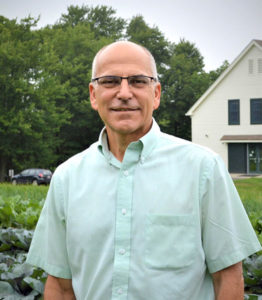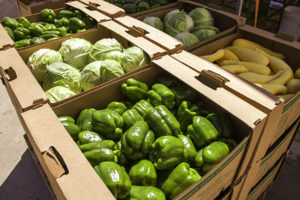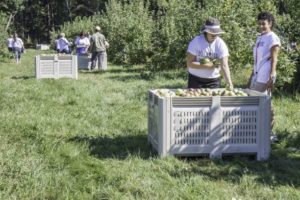By Abbey Basile, Contributing Writer

Grafton – The Community Harvest Project (CHP) – a nonprofit farm that grows and harvests fresh fruits and vegetables for families and individuals in need in the Worcester area – has adapted to the effects of COVID-19 in order to produce a bountiful harvest in 2020.
Though the organization typically relies on thousands of volunteers each year, Wayne McAuliffe, manager of volunteer programs for CHP, stated that with the onset of the pandemic, plans for planting and harvesting on the 14-acre farm needed to be adjusted.
McAuliffe explained that usually the farm would see up to 100 volunteers a day from the beginning of May up until mid-June for its planting season, but because of COVID-19 restrictions, such large gatherings of volunteers were not possible. Instead, the fields were planted with the help of one of the project’s funders – the Reliant Foundation, who assisted in purchasing a mechanical planter – and with the help of staff, a very small group of volunteers, and the CHP advisory board.

Due to COVID-19 restrictions, adjustments have been made to ensure the safety of the volunteers. Though the project has previously allowed for drop-in volunteering, Tori Buerscahper, development manager at CHP, explained that individuals must now sign up before volunteering as a safety measure.
CHP will also compile a daily list of every person who has visited the property, and those who do visit the property are asked to self-regulate. The project starts the day with handwashing and a huddle covering protocols, and throughout the day, hand sanitizer is available and masks are worn, even outside if volunteers and staff come within six feet of one another.
McAuliffe stated that the small groups of volunteers who helped during planting season “allowed [CHP] to really test out our safety protocols to make sure that we were doing everything right [for the harvest season].”

In addition to volunteering, individuals may donate to support hunger relief in the community. Buerscahper explained that one can make a direct donation, participate in a monthly giving program, donate equipment on the project’s wish list, or “adopt” a row or tree on the farm.
“That is a symbolic adoption where you essentially care for a particular row or tree for the entirety of the season, so that all of that produce can be donated,” said Buerschaper.
Other changes include transforming their spring fundraising plant sale into a virtual experience with curbside pickup, and eliminating the planting of flowers for the project’s annual flower festival, which allowed for more farmland to be used for produce in order to meet the year’s greater need.
Over the past five years, Community Harvest Project has donated one million pounds of produce to hunger relief efforts.

“Our partners reported very shortly after the pandemic struck and lay-offs began to happen that the increase in demand on services was 200 percent,” McAuliffe said. “The need is growing, and likely, will be here for quite some time.”
Additionally, CHP recently announced that the Board of Directors has appointed Jim McPherson as its new Executive Director.
For more information on how to volunteer or donate, visit community-harvest.org or email [email protected].
Photos/submitted














